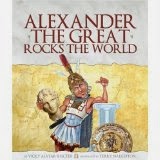Publisher's Weekly called Cleopatra's Moon, "fascinating" and said said "the novel's atmospheric setting and romantic intrigue are highly memorable." The LA Times called it "magical" and "impressive," while The Wall Street Journal called it "absorbing." The School Library Journal called it "a fantastic read." Other accolades include being named to Entertainment Weekly.com's "Must Read" List and The Atlantic.com's list for "Young Adult Historical Fiction Adults Should Read."
Crystal Kite Award Winner
Junior Library Guild Selection
CHAPTER ONE
In the Seventeenth Year of My Mother's
Reign
In My Seventh Year (34 BCE)
PART I: EGYPT
What caused the gods to fall upon my family like starved lions
in a Roman arena?
I suspect it began in my seventh year, on a day that I once
considered one of the happiest of my life. It was a dazzling, sun-drenched
summer morning in Alexandria-by-the-Sea. Outside the Royal Quarter, with the
Mediterranean sparkling behind us and rows of date palms swaying before us, my
mother and brothers and I sat alongside one another on individual thrones. We
waited for my father, the great Roman general Marcus Antonius, to finish
parading through the city and join us atop our grand ceremonial dais. The
ceremony today would celebrate his victory over Armenia, his eastern enemy. And
we --- his family and all of Alexandria --- would rejoice with him.
Even in the shade of
our royal canopy, sweat trickled down my neck and back. The ostrich-feather
fans the servants waved over us provided little relief. Strong breezes
occasionally gusted from the Royal Harbor, cooling us with the salty bite of
the sea. Despite the discomfort and the glare from the beaten silver platform
at our feet, I forced myself to keep still as Mother had instructed, my eyes
trained just above the horizon. Zosima, who had carefully painted my face, had
forbidden me from squinting in the bright light. I was not to ruin the heavy black kohl
around my eyes and eyebrows, and under no circumstances to cause the green
malachite painted on my lids to flake off. I was not even to turn my head. I
would follow all the rules perfectly, I swore to myself. I would make Mother
proud.
But excitement and curiosity burbled in my blood as I fought to
stay still, stealing side-glances whenever I could. I especially treasured my
glimpses of Mother, Queen Cleopatra VII. She sat on a golden throne, looking as
resplendent as one of the giant marble statues guarding the tombs of the Old
Ones. Diamonds twinkled in a jungle of black braids on her ceremonial wig. She
wore a diadem with three rearing snakes and a golden broad collar, shining with
lapis lazuli, carnelian, and emeralds, over her golden, form-fitting pleated
gown. In one hand, she held a golden ankh of life, while the other clasped the
striped crook and flail of her divine rulership. Her stillness radiated power,
like a lioness pausing before the pounce. It left me breathless with awe.
I sat up straighter, trying to emulate her, puffing up with
pride at the realization that only Mother and I were dressed as true rulers of
Egypt --- she as the Goddess Isis and I as the moon goddess, Nephthys. After
all, was I not named for the moon? My brother may have been called Alexandros
Helios, for the sun, but I was Cleopatra Selene, the moon. I wore a flowing
dress that reminded me of the liquid metal that the scientists at our Great
Library described as "living silver." A silver diadem of the moon sat
atop my own thickly braided ceremonial wig. Even my sandals flashed silver.
I had never seen my beloved city so packed. By the tens of
thousands, Alexandrians and Egyptians flooded the wide avenues and byways,
desperate to catch a glimpse of us or of Father on his parade route. The
richest of the noble Greek families sat on tiered benches in the square before
us, while tradesmen, merchants, and the poor spilled into the streets,
squirming and jostling for position. Some even shimmied up trees, climbed onto
the shoulders of the statues of my ancestors, and scrabbled to the tops of
pediments and roofs to get a better view of us. The roar of the crowd as my
father approached in his chariot sounded like waves crashing against the rocks
on Pharos Island, home of our Great Lighthouse. When Tata climbed onto the dais
to join us --- his golden armor gleaming, his face soaked with sweat but
shining with joy --- he looked like a god. The God of War!
In his deep bass,
Father began: "I stand before you as Imperatorto the greatest of all civilizations, made even
greater by the loyalty and fealty of its allies. Today, we remind the world
that it is far, far wiser to be Rome's Friend rather than her Enemy."
Our people roared in agreement.
"The foolish King
Aatavartes of Medea thought to test Rome's strength," he continued, the
crowd groaning at the king's stupidity. "He sought to ally with Rome and Egypt's enemy in a greedy bid
for power and riches. He thought to claim our weapons and weaken us. But he
could not, for Rome and Egypt are blessed by the gods, our victory proof of the
favor with which the Immortal Ones hold us . . ." I lost track of Tata's
speech then and started counting the golden beads on the fan slave's broad
collar. I had gotten up to forty-seven (after having to start over several
times) when Father's voice cut through my reverie.
"It is time," he announced, "to make my
Dispositions of War, to reward Egypt for her unceasing loyalty."
The crowd whooped and
stomped. I perked up. Tata was about to bestow his gifts to us, his family.
To me! My mind raced with
the possibilities. Was I to receive a new crown from his plunderings? A golden
chariot? Or perhaps an exotic beast, maybe even one that breathed fire? Tata
turned toward my two-year-old brother, Ptolemy Philadelphos, who sat beside me.
Ptolly looked just like our tata, with a head of shining dark curls,
mischievous brown eyes, and the barrel-chested body of a bull. The crowds had
swooned with adoration at the first sight of him swaggering in his tiny
military cloak and boots.
"To my youngest son, Ptolemy XVI Philadelphos," Father
bellowed as the crowd hushed in anticipation, "I grant the lands of Phoenicia,
Syria, and Cilicia."
The people roared. I
drew a breath, stunned. Father was giving us kingdoms? I forgot to keep my head facing forward and turned
to Ptolly. He scowled furiously, waggling his chubby legs in his toddler-sized
throne as the noise reverberated around us. Worried that he might begin to cry
or have a tantrum, I took his pudgy hand in mine and bent toward his ear.
"Look at Tata," I instructed. "He is talking to
you!"
Ptolly locked eyes with Father. When Tata grinned at him, Ptolly
grinned back, showing all his little milk teeth. Then he toddled toward Tata,
to the crowd's cooing delight. One of the guards intercepted him and escorted
the little general off the dais.
"To my daughter, Princess Cleopatra VIII Selene,"
Father called, and I felt the attention of thousands land on me like a physical
force --- an energy that made me sit up straighter and raise my chin, despite
my racing heart. "I confer Cyrenaica and Crete, where she will rule as
queen. May she rule with as much wisdom as her namesake."
I was queen! Queen of Cyrenaica and Crete! As the people
thundered their approval, Tata caught my eye and winked. Forgetting protocol
again, I grinned and inclined my head. This sent the crowds roaring even
louder, and I heard my name chanted over and over again. I marveled at the
power pulsating all around us --- power freely laid at our feet, ours for the
taking.
I wanted to jump up,
to hug my tata, to do anything but
continue sitting like a block of marble. But, of course, I would not disappoint
Mother. I held my breath, pretending to be as solemn and immobile as the giant
statues of the Great Ones.
Tata turned his attention to my twin, Alexandros.
"To my son, Alexandros Helios, I bestow the kingdom of
Armenia, where he will rule with his betrothed, Princess Iotape of Medea."
The crowds whooped in honor of Father's decisive victory in the
region, but I refused to steal even a side-glance in my twin's direction.
The Interloper sat between us.
The black-eyed, silken-haired little princess was nothing more
than a royal hostage --- a guarantee that her father the king would stay loyal
to Tata. But I could find no warmth in my heart for her. The way Alexandros
acted around Iotape, it was as if Hermes himself had come down from Mount
Olympus and hand delivered her to him. Until she showed up, he and I had lived
as if we still shared a womb --- playing, sleeping, eating, and laughing
together. But now it was Iotape my twin sought out at first light and played
with until dusk, when Ra's sunboat descended into the Dark Lands. I would not
forgive her for taking him from me.
Still, our people continued to cheer at the announcement,
celebrating the return of a strong and vital Egypt. Armenia and Cyrenaica had
been under our dominion when our Macedonian-Greek ancestor Alexander the Great
and our dynasty's founder, his brother Ptolemy theFirst, took Egypt nearly
three hundred years ago. We Greeks had ruled ever since. And now, thanks to
Tata, we were stronger than we had been in centuries.
"In
addition," Tata bellowed, "I bequeath to Alexandros Helios and his
betrothed rule over all the
lands of Parthia!"
I barely noticed the undercurrent of bewilderment that rippled
through the crowds, the whispers of, "How could the General give away
lands he has not yet conquered?" After all, my tata was the best general
in the world. Of course he would conquer Parthia!
Tata then turned his attention to my older half brother,
Caesarion, the only son of Mother's first husband, Julius Caesar. At thirteen,
Caesarion was slim and tall, and I thought he looked magnificent in the kilt
and pectoral of a pharaoh, combined with his father's bloodred Roman cloak.
"Ptolemy XV Philopator Philometor Caesar," Tata
called, "I name you the true heir and only son of Gaius Julius Caesar. And
I name you the king of Egypt!"
From the corner of my eye I spied Caesarion lifting his chin,
and my heart swelled with love and pride. My brother, the king! The king of
Egypt!
But again, murmurs of
unease snaked through the crowds, accompanied by whispers of a name I did not
then know:Octavianus. I
blinked, confused. Why should a Roman name be on our people's lips when
Caesarion was rightly being named their king? I tried to make sense of the
murmurs: "Isn't Octavianus Caesar's heir?" "Is Antonius
challenging him?" Some in the crowd even made the sign of protection
against evil. I stole a glance at Mother. She let out a breath that sounded
like a hiss. And although her face kept its expression of queenly impassivity,
I saw a flicker of concern settle on the tiny space between her brows. But it
may have only been a trick of the fierce Egyptian light, for when I looked
again, Mother's face appeared as majestic and untroubled as it always had.
Tata glanced at Mother, and his eyes crinkled before he turned
back to the crowds. "To my wife, Cleopatra VII Philopator, Queen of Egypt
and overlord of all the kingdoms bestowed today . . ." A rumble of cheers,
shouts, and joyous exultations interrupted him, almost as if our people were
thrilled to move on to what they knew and loved. The cheers swelled until I
felt them vibrating in my chest bones. Mother did not move as the entire city
chanted, "Isis! Isis! Hail Isis! Isis our queen!" When the wave of
noise crested, Tata began again. "Today," he boomed, "I name my
wife Queen of Kings, Ruler of the Two Lands, Overlord of our Children's
Territories, and Partner in managing Rome's interests in the East. I have a
vision of the future --- a vision of cooperation, not destruction. Borne up by
the loyalty of client kings and queens, Rome cannot be stopped."
He swept his arm toward the Lighthouse. "And like Pharos
that shines into the night, Egypt serves as a beacon to Rome's future. A future
of partnership. A future of immeasurable wealth. A future that no man or king
can rend asunder!"
The whoops of joy became deafening. Tata grinned and held both
arms up in exultation. He bid Mother stand next to him. The bright Egyptian
light seemed somehow concentrated on them --- I had never seen them look more
godlike.
As the priests and priestesses chanted the final prayers, I
wanted to jump and cheer and laugh. It was my family's proudest moment! I drank
it all in --- the masses cheering; the white-robed Priests of Serapis chanting
over bowls of smoky incense; the long-haired Priestesses of Isis extending
their thin arms to the sky; the sweet fragrance of flowers as countless petals
swirled around us, floating through the air like tiny perfumed birds. It was
all so beautiful, almost magical. The Triumph of the Ptolemies! The greatest
moment of our lives. But the gods would not stand for us to have such happiness
for long. And so began the slow, excruciating process of our undoing.
Purchase Cleopatra's Moon










No comments:
Post a Comment